“Why are you giving a lecture?” a woman in the audience said as she stood up. Her voice was hard and defiant. A few others joined the chorus. They wanted intimate groups, creative exercises, and art, not lectures.
I understood. Women and a few men had come to Omega Institute expecting a Marion Woodman workshop. They wanted a body-soul experience with mythology, art work, dancing, and transformation, but Marion was co-leading this weekend with Dr. Carol Gilligan, a professor who wrote In a Different Voice and The Birth of Pleasure. Carol presented her academic lecture with a toss of her long black hair and click of high heeled boots. She was used to being in charge.
Marion stood near Carol since the anger was directed at both of them. I longed to defend and protect Marion, but she didn’t need my help. Draped in a soft purple shawl and standing strong, she paid close attention to the accusations without a hint of defensiveness. She simply listened.
The room was set up for a large lecture–hundreds of chairs in rows with a raised lectern at the front, not Marion’s usual style. Dim cold autumn light barely pierced the darkness of the crowded room. As Marion listened to the frustration, the energy of the room calmed and warmed.
Marion spoke next, discussing the need for women and men to balance inner feminine and masculine energies. As usual, she didn’t use notes, and at the end of the morning, she announced an unscheduled dream session after lunch. She wanted to hear dreams about Diana Spencer, Princess of Wales. It was 1997, just after Princess Diana’s death which hadn’t mattered to me, but I was interested in Marion’s perspective.
The smaller room was packed as Marion worked with a few dream images. Carol Gilligan wasn’t there. Marion discussed the international outpouring of grief following Diana’s death and wanted to know our experiences and dreams about that event. Marion saw a collective archetypal response to the loss of the young woman who stood up to royalty and power structures. Instead of Diana, the woman on gossip pages, Marion was fascinated by the symbolism of the princess who dared to walk away from the prince, privilege, and palace.
I’d judged the pink flowers and teddy bears piled up near the palace fences as silly, but Marion looked for a deeper significance. Why did so many people, especially women, feel deep personal grief over the princess who abandoned her assigned role?
That afternoon, Marion spoke of the powerful young feminine within women and men that demanded recognition and a voice. In Marion’s words, Diana “left her father’s house” and risked all to find her own life.
The next morning, Carol shared her research showing how girls in early adolescence step back from power and let boys take the lead. On average, adolescent girls risk less, fear more, and stop taking leadership positions. It’s what our culture expected and demanded, but fortunately that’s changing.
The audience was respectful, but I felt a wave of relief when Marion announced another unplanned gathering. She would lead a ritual dance to end the workshop. About 100 people showed up including my close friends from a mythology class who were also there that weekend.
Marion suggested we stack the lines of chairs against the walls. We stood in a large circle as Marion gave simple instructions for a dance I’d done with her before. A circle dance, easy to learn and set to haunting Greek music sung by Nana Mouskouri.
One step in with 2 gentle dips, one step back, dip, dip, one step to the right, dip, dip. Repeat and repeat as the circle slowly moved to the right. We held hands and met the open gaze of those across the circle. We were a community of mutual support and soul connection.
After all, that’s what we’d come for.
***
Do you remember how Princess Diana’s death affected you? Are you able to listen without defensiveness when people are angry at you? Marion’s openness to receiving anger and her ability to hear and act on the needs of others impressed me. For other experiences with Marion Woodman, see The Black Madonna Wore Pink. For an article about how I endured anger when people wanted to pollute our beautiful Seneca Lake, see Angry Faces, Placid Water. I’m thankful for use of images in public domain for this story.
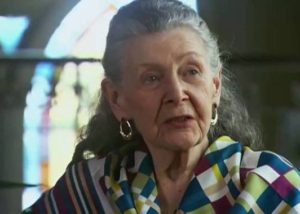
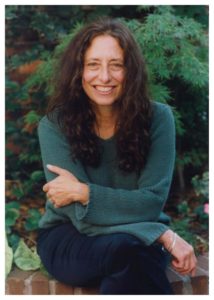

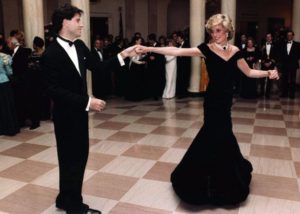
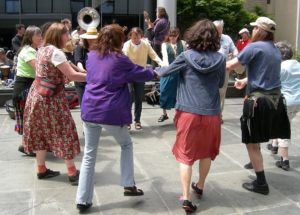
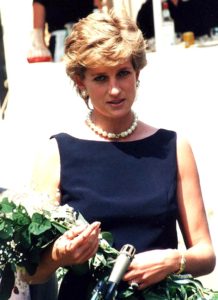
Wow ~ there is such interesting synchronicity for me in your post, Elaine, as I was just going online to find out when Princess Diana died — because I was remembering something that happened that weekend and wanted to figure out what year it was.
I never have understood why it felt like such a significant event to me at the time, and why I remember the exact moment I heard it on the radio while in the car, until reading your post today with Marion’s words: “Diana ‘left her father’s house’ and risked all to find her own life.” I feel such a resonance with that.
I also remember Mother Teresa dying a little over a month later and thinking that there was a symbolic link to the loss of these two seemingly radically different and famous women. And now I understand more about a deep commonality they shared.
I agree about Mother Teresa, Anne, and thanks for reminding me. Mother Teresa is another aspect of powerful feminine symbolism, so we have the princess connecting with the wise spiritual crone, the new moon and the dark of the moon. They met around 1992 and apparently developed a deep connection. There are many articles about this and I need to read a few to remember the details. I easily found images of Diana in a white suit with white spike heals bowing forward to greet the tiny nuns surrounding Mother Teresa. Thanks again.
It takes grace and strength to respond to indignation. Marion, Carol (and you) have demonstrated that strength by listening, even if you felt anger in the process. I remember an incident when I led our community in opposing Walmart’s expansion into the woods and wetlands close to our neighborhood. Many neighbors attended public hearings and hosted in-home planning sessions – all amicably. Imagine my surprise when one evening I opened the door to two irate neighbors who cussed me out for defying the effort to plant a larger version of the place they wanted to shop. I was so shocked, I think I just stared at them and mumbled some acknowledgment of their feelings.
I remember feeling sorry for Diana’s death because it was so untimely. There is a lot of blame to go around in this scenario, I believe: a Queen who pushed her son into a loveless marriage, a prince who would not give up his lover, the monarchy itself and its archaic rules, which are now being challenged with Meghan and Harry, thank goodness.
Circle dancing is a wonderful way to express community. Thanks for all of these images and the narrative which bespeaks the courage required to face opposition. Brava!
Marian, thanks for sharing your story of facing anger. I saw some of that with trying to educate and then block gas storage in the abandoned salt mines under Seneca Lake. After many years and lots of anger, everyone in the community became convinced it was a bad idea. Whew! Going door to door to talk about it was an eye opener because there was so much hostility. I also agree there’s much blame and drama surrounding Diana’s marriage. That never interested me, but the outpouring of grief was powerful and notable and Marion helped me see the significance. The comment before yours mentions that Mother Teresa died not long after Diana and I remember they had a strong connection. The princess and the ascetic.
Marion Woodman loved circle dances and also something she called the Dance of Three. I loved how she heard what people needed and wove it into a structured weekend by giving more of her time rather than confronting her co-leader. She saw a need and responded to it. I wonder if she and Carol talked about this, but I have no idea.
Having finished reading your book ‘Mennonite Daughter: The Story of a Plain Girl,’ I know that you were also a young woman who dared to walk away from the role assigned to you and “leave your father’s house” to find your own life. You were good at keeping the parts of your history that suited your new life.
😉
I do indeed remember the sudden, unexpected death of princess Di. It hit me hard. I had loved following her life, her choices, her ups and gowns. And here, I’ve loved hearing the idea that Diana stood her own ground, walked away from her prince.
As a Gestalt psychotherapist I am able to hear people’s anger without reacting to it and getting caught up in it. It’s theirs, not mine. That’s not difficult. At the same time I remember too well the years before my training when another persons anger scared me. I know how easy it is to get defensive. And how important to bringing back an eta of civility again, that we learn to listen to the other, even when they are angry.
Thank you for yet another great post, Elaine .
Marion was an ace at not getting caught in another person’s anger. It sounds like you are, too. Marion said she grounded herself in her feet and let the anger flow through her and out through her feet without getting stuck in her body. (I did a month of Gestalt Therapy at Esalen Institute soon after Fritz Perls died in 1970, and it’s been one of my private modes of exploration. Vic and I used some Gestalt techniques when we led psychodrama.) I hope our country and culture will recover from the wild anger that’s been released and projected. Thanks so much for commenting.
Oh, I vividly remember the day Princess Diana died as I found myself sobbing in shock and endless tears! I couldn’t explain (even to myself) why I felt heartbroken at the time but I did. That first morning I had a hairdresser’s appointment and instead of having my usual haircut I asked my hairdresser to cut my hair into Diana’s latest look which he did. On the one hand it felt like a fitting tribute, and on the other, my action felt like it was not entirely my own … if that makes any sense. I just felt drawn to act in this way despite never meeting or knowing Diana in my life … except in magazines or on TV.
Yes indeed! The fact that Diana was not only a Princess but a woman who dared to say, “No!” deeply affected me. So when I heard of her death I felt crushed yet an incredible strength arose in me to leave the life and lie I was living at the time. I too became a woman who said, “No!” and was prepared to die rather than continue to live a life where I existed and wasn’t living at all. In pure synchronicity, I called it the year I left my father’s house too! There are echoes of this within my poem, “A Liberated Sheep in a Post Shepherd World”.
Personally, I’m still working on my “listening to people who are angry with me” skills but know that when I look back 10, 5 or even 1 year ago, I see that I continue to be a work in progress. Thank goodness! On another note I do wonder if typology has something to do with people’s reactions when listening to a lecture because as an INFP with strong feeling, I often find them “dry” unless the presenter includes “feeling” i.e. dance and dream work” because too much “thinking” is not juicy enough for my soul!
As always a wonderful, rich, deeply feminine post Elaine which as you’ve probably guessed has stirred much up within. I shall be reflecting on this for quite some time and feel a strong desire to reread many of Marion Woodman’s superb books. Thank you! Warm autumnal wishes, Deborah.
Deborah, you’re British and you needed to leave “your father’s house”–so it makes complete sense that you would take part in the archetypal even both consciously and unconsciously. I know you used that same metaphor in your poetry without being influenced by Marion Woodman and perhaps before you studied Jung. You came to it in your own inner search which makes it all the more valuable.
Marion was never an academic lecturer even though she taught at University of Toronto sometimes, but that was Carol’s professional mode. Carol came to Omega with her academic thinking approach (I have no idea what she was like as a person outside that role, but her books were revolutionary and powerful.) Marion came as an intuitive, so a very different approach and typology. Blessings to you and all the women who find the courage to leave their father’s house.
Thanks for highlighting Diana’s need to leave her Father’s house Elaine. Maybe that’s the tragedy – leaving her father’s house resulted in her fate of her early death? The risk that was taken had consequences.. Hers is a mythological tale four modern times.
I loved your comments to responders … they always widen the circle.
On a few occasions in the past, I’ve said to the other, NO, I will not bear your projection … it’s yours and I’ll have nothing to do with it. Luckily, I’ve also looked at how it was that I was the hook which isof course another story …
I remember my niece coming into the kitchen on that fateful day when my sister & I were making salads for a lunch party she was hosting, and she told us. Of course we didn’t believe it – until later. It was dreadful …
Thanks for commenting, Susan. Marion had an interesting way of looking at the outpouring of grief which hadn’t made a strong impact on me until the workshop. I agree that leaving father’s house has big risks, but Marion knew it was necessary and helped me take in the mythological dimensions of the event. There’s so much anger in my culture right now, but I’m grateful I don’t deal with direct person-to-person anger. Vic and I enjoyed a feisty relationship and I sometimes miss that part of life.
The one thing that stood out to me is that someone listened to those that were voicing their disagreements (without judgment or getting ready to say something). I believe that so many are feeling unheard these days, that for anyone to listen is worth more than a piece of gold. Yes, our society does need to learn how to balance, and I am in total agreement, but with all our modern communication methods, there are so many feeling unheard. Sometimes the best thing we can offer another person is a listening ear. It can be so empowering and comforting.
Marion was so good at listening, Don–and watching. It seemed absolutely natural to her. She’d been a much loved high school English and drama teacher and then became a Jungian analyst in mid life. She loved group work and shared leadership and was curious about others including their anger and conflict rather than reactive and self-protective. She heard conflicting points of view or hurt feelings behind the anger and, in the case of the workshop, she understood what people wanted and made changes that erased her own rest breaks between sessions. So many people were inspired and comforted by her. Thanks so much for your reflections.